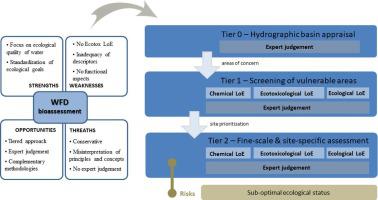Ecological Indicators ( IF 7.0 ) Pub Date : 2020-10-13 , DOI: 10.1016/j.ecolind.2020.107030 Joana Isabel Santos , Tânia Vidal , Fernando J.M. Gonçalves , Bruno Branco Castro , Joana Luísa Pereira

|
The EU Water Framework Directive (WFD) assessment scheme has been putting in force the evaluation of freshwater ecosystems in Europe, including a new paradigm of ecological status. After almost 20 years since the WFD implementation, it is imperative to evaluate the efficiency of its standard assessment scheme and to explore the possibility of learning how to improve its effectiveness. That is the spirit of this review, aiming (i) to explore the existing literature on the WFD bioassessment scheme for assessing freshwater ecosystem health, particularly in lotic ecosystems (where the WFD scheme is most consolidated); (ii) to document which paths are suggested by the scientific community to improve the efficiency of the bioassessment in tackling current challenges. In the specific arena of bioassessment, we first identify the major constraints to the WFD full implementation in rivers. Second, we analyse retrospective Ecological Risk Assessment (ERA) as an evaluation approach supporting management actions that could inspire improvements in the WFD bioassessment scheme. Third, we review the advances and debate on complementary metrics to improve WFD evaluation protocols and/or the feasibility of the evaluation outcome. Fourth, a conceptual scheme for an improved evaluation strategy is presented. Our proposal essentially merges the WFD bioassessment scheme with the ERA philosophy, proposing a tiered approach of increasing complexity and spatial resolution, where expert judgement is included surgically at all decision stages. This scheme requires true integration of chemical, ecological and ecotoxicological LoE for a quantitative estimation of risks, and provides a comprehensive framework that accommodates tools and perspectives already suggested by other authors. Besides providing a literature review on the strengths and weaknesses of the current WFD bioassessment scheme, we wish to open way for the scientific discussion towards an improved conceptual scheme for the evaluation of ecosystem health.
中文翻译:

欧洲水质评估面临的挑战–河流中目前的《水框架指令》生物评估计划是否还有改进的余地?
欧盟水框架指令(WFD)评估计划已开始对欧洲的淡水生态系统进行评估,其中包括一种新的生态状况范式。自WFD实施近20年以来,必须评估其标准评估方案的效率,并探索学习如何提高其有效性的可能性。这是本审查的精神,目的是(i)探索有关WFD生物评估计划的现有文献,以评估淡水生态系统的健康状况,特别是在Lotic生态系统中(WFD计划得到最充分的评价);(ii)记录科学界为提高生物评估应对当前挑战的效率所建议的途径。在生物评估的特定领域,我们首先确定阻碍WFD在河流中全面实施的主要障碍。其次,我们将回顾性生态风险评估(ERA)分析作为一种评估方法,以支持可以激励WFD生物评估计划改进的管理措施。第三,我们回顾研究进展并就补充指标进行辩论,以改善WFD评估协议和/或评估结果的可行性。第四,提出了一种改进评估策略的概念方案。我们的建议从本质上将WFD生物评估计划与ERA理念相结合,提出了一种提高复杂性和空间分辨率的分层方法,其中在所有决策阶段都通过外科手术包括专家判断。此计划要求真正整合化学,生态和生态毒理学LoE,以定量评估风险,并且提供了一个综合框架,可以容纳其他作者已经提出的工具和观点。除了提供有关当前WFD生物评估方案的优缺点的文献综述之外,我们还希望为进行科学讨论以寻求一种改进的概念方案来评估生态系统健康开辟道路。











































 京公网安备 11010802027423号
京公网安备 11010802027423号